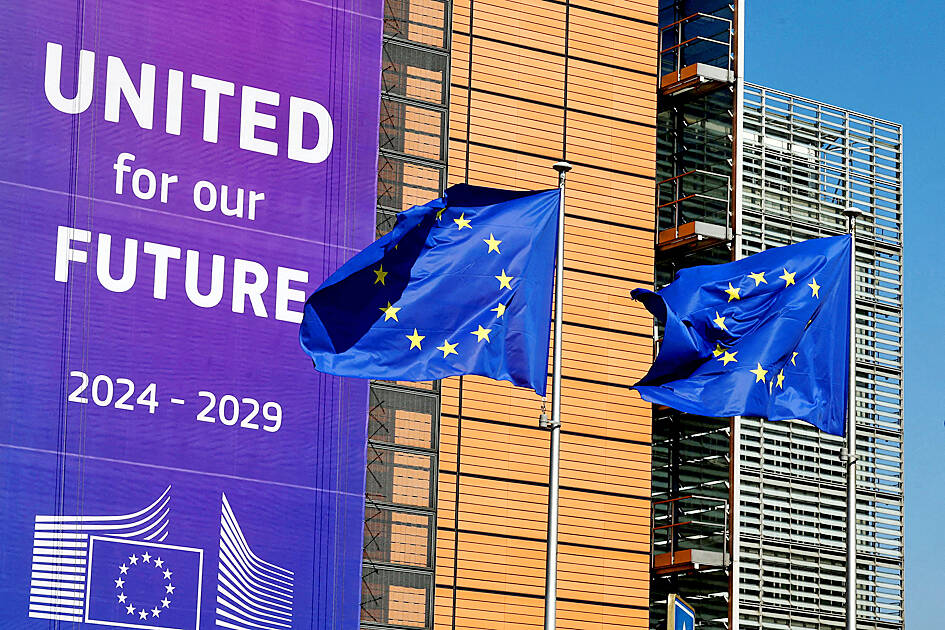Eurozone industry and trade took major hits in April, likely reflecting US tariffs announcements, challenging the view of economists that the bloc is holding up well in the face of economic turmoil.
Industrial production fell by 2.4 percent month-on-month in April, more than the already-weak expectation of a 1.7 percent fall in a Reuters poll of economists, as every segment within industry suffered a contraction, data from Eurostat showed yesterday.
Trade also suffered, with the surplus of the nations sharing the euro falling to just 9.9 billion euros (US$11.4 billion) compared with the previous month’s 37.3 billion euros.

Photo: Reuters
The weak figures were not unexpected as US firms were front-loading purchases in February and March in anticipation of the April 2 tariff announcement, but the reversal is larger than many had anticipated, indicating downside risks to annual economic growth forecasts, which are already below 1 percent.
The eurozone’s exports to nations outside the bloc fell by 8.2 percent in April, while figures for the broader EU showed a 9.7 percent drop, Eurostat said.
The EU’s total exports to the US, its biggest trading partner, totaled 47.6 billion euros in April, well down on the 71.1 billion euros reported a month earlier, which was itself considered unusually high.
The drop was mainly driven by sharply lower chemicals exports, likely relating mostly to pharmaceutical exports from Ireland, which hosts a number of international firms that are located there for tax reasons.
Irish pharmaceutical exports to the US surged in the months leading up to the tariffs, pushing economic growth up to exceptional levels.
The figures also explain why Irish industry contracted by 15 percent in April, dragging eurozone production lower.
The hit to the industry was so large that it erased nearly all gains from the past year, and output in April was just 0.8 percent higher than a year earlier, with only nondurable consumer goods showing any year-on-year increase.

NEW IDENTITY: Known for its software, India has expanded into hardware, with its semiconductor industry growing from US$38bn in 2023 to US$45bn to US$50bn India on Saturday inaugurated its first semiconductor assembly and test facility, a milestone in the government’s push to reduce dependence on foreign chipmakers and stake a claim in a sector dominated by China. Indian Prime Minister Narendra Modi opened US firm Micron Technology Inc’s semiconductor assembly, test and packaging unit in his home state of Gujarat, hailing the “dawn of a new era” for India’s technology ambitions. “When young Indians look back in the future, they will see this decade as the turning point in our tech future,” Modi told the event, which was broadcast on his YouTube channel. The plant would convert

‘SEISMIC SHIFT’: The researcher forecast there would be about 1.1 billion mobile shipments this year, down from 1.26 billion the prior year and erasing years of gains The global smartphone market is expected to contract 12.9 percent this year due to the unprecedented memorychip shortage, marking “a crisis like no other,” researcher International Data Corp (IDC) said. The new forecast, a dramatic revision down from earlier estimates, gives the latest accounting of the ongoing memory crunch that is affecting every corner of the electronics industry. The demand for advanced memory to power artificial intelligence (AI) tasks has drained global supply until well into next year and jeopardizes the business model of many smartphone makers. IDC forecast about 1.1 billion mobile shipments this year, down from 1.26 billion the prior

People stand in a Pokemon store in Tokyo on Thursday. One of the world highest-grossing franchises is celebrated its 30th anniversary yesterday.

Zimbabwe’s ban on raw lithium exports is forcing Chinese miners to rethink their strategy, speeding up plans to process the metal locally instead of shipping it to China’s vast rechargeable battery industry. The country is Africa’s largest lithium producer and has one of the world’s largest reserves, according to the US Geological Survey (USGS). Zimbabwe already banned the export of lithium ore in 2022 and last year announced it would halt exports of lithium concentrates from January next year. However, on Wednesday it imposed the ban with immediate effect, leaving unclear what the lithium mining sector would do in the